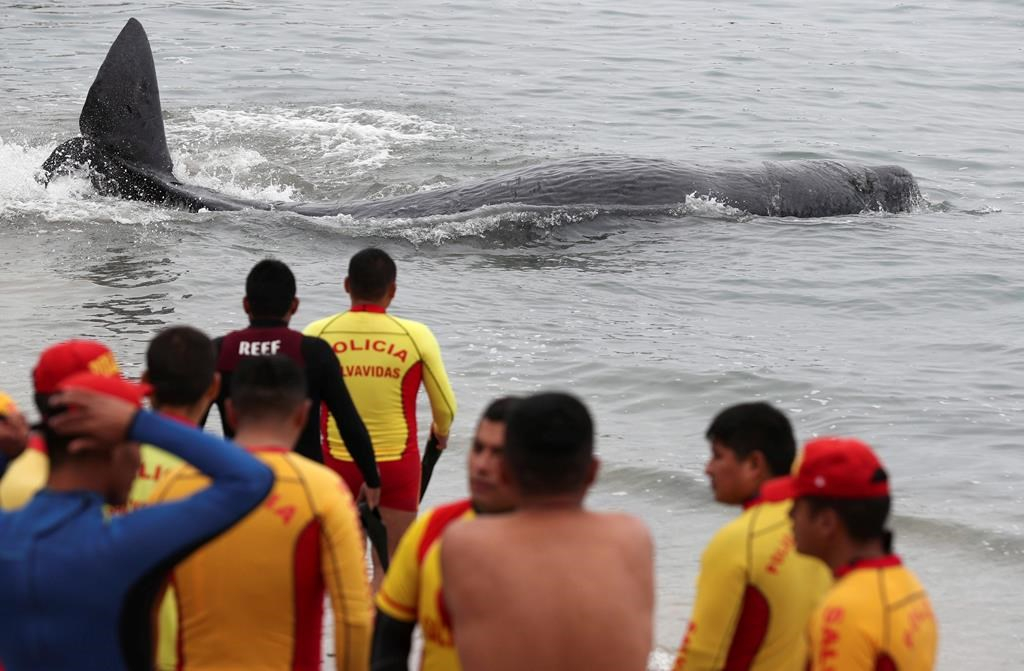Survival of the Fittest to Adapt
/cloudfront-us-east-1.images.arcpublishing.com/tgam/TNU5OY6BARAFBCO3XLEYQSETFQ.JPG) |
| The fluke of a Sperm Whale |
"We don't have good data sets to do this [research sperm whales' reaction to being hunted]. The problem is, when we as humans start exploiting anything, we don't tend to keep very good records of it. This makes it hard to figure out the potential for animals reacting to this, because we don't have good records.""These [hunting whales for whale-oil lamps] were the Texaco of this era, these guys [American whalers] killing sperm whales, getting the oil, selling the oil and making huge amounts of money.""That was very remarkable [the discovery of a sudden drop in whale hunting success]. I thought there might be a drop, but not that much and not that quickly. Usually, you expect it to increase as they figure out stuff and become more successful [hunters]. That's typically how our exploitation of wildlife goes. We become more efficient as we learn how to do it.""This pattern [whale herds transmitting information to others] is more like agriculture, a new idea which develops and becomes really important. I'm really interested in this diversity of culture in the whales, and this is a wonderful example of it.""We're still affecting the ocean. Whether they're learning about those things and how to deal with them, we don't know. But hopefully they [whales] are."Hal Whitehead, biology professor, Dalhousie University, Nova Scotia

The North Pacific Ocean was the hunting grounds for whale hunters searching out sperm whales. With the use of flimsy rowboats and harpoons thrown by hands whalers looked for large groups of whales, valued for their oil at a time long before electricity, in the 18th and 19th centuries. Old fishing logs attest to the curious observed fact that these hunts' success became less fruitful. Yields became reduced by over half in a period of a mere two years.
Harvesting whales was big business whether carried out in the Atlantic, Pacific or Arctic waters. Whales were the source of oil used for lighting, whalebone from Baleen whales used for women's corsets, hoops for skirts, and for bags, and ambergris for the production of perfumes, among a myriad of other whale-sourced products. So whales were big business and business was booming. Until suddenly it wasn't. Whales were no longer easy prey.
And researchers feel they have discovered the answer to that puzzle. Published in The Royal Society journal, a new research paper states that sperm whales learned from their experiences at being relentlessly hunted. They devised methods whereby they successfully eluded the hunters and in some instances defying them both by prevention and through fighting back against human predators. Through their self-defence tactics they succeeded in reducing whale killings by 58 percent.
Biology professor Hal Whitehead whose specialty is the study of whales, mostly sperm whales for the past 40 years, analyzed their behaviours and social systems and when he discovered a trove of digitized documents representing thousands of captains' logs and fishing logs with detailed accounts of whaling expeditions worldwide, he was intrigued by the descriptions of the behaviour of whales.
At some point in the 19th century whalers were noting complaints of catching fewer whales by far than they were accustomed to. Because most whaling expeditions hadn't maintained detailed logs it occurred to him to assemble a research team of biologists and data scientists to pay attention to American whaling expeditions in the 19th century in the North Pacific. That area specifically as a region where expedition logs tended to be more complete.
A data set of 77,749 voyage days including 1,405 days where whalers spotted sperm whales were compiled. They encountered the discovery of a 58 percent drop in successful sperm whale hunts within a narrow period of slightly over two years, a reality that Professor Whitehead described as having the effect of being "pretty well blown apart by that. That was very remarkable." Pre-human-hunting on the whales' territory, sperm whales weighing over 40,000 kilos feared only killer whales.
They would typically defend themselves by forming a large circle, their young assembled protectively in the centre, and fight back against the killer whales with jaws and tails, and it was a good working strategy. The whales discovered, however, that what worked to protect themselves against the killer whales, worked against their favour when confronting human whale hunters."This is what they did to their previous enemy. So they now have this new enemy, and this is almost the very worst thing you should do when faced with Captain Ahab. To form a tight group, slow moving, just sitting there, it's a wonderful target for someone throwing a harpoon."
Soon the hugely successful whalers saw a shift in their fortunes. The sperm whales stopped gathering in a circle once the hunters arrived. Instead they would swim upwind where weak rowboats couldn't follow. Some of the whales took to attacking the fragile boats. And they were communicating, according to the study, sharing their strategy as an aid to fight off their attackers. Before long whales straight across the entire North Pacific were emulating the first sperm whales' strategy.
A strategy that succeeded for a while. Until more advanced whaling technology consisting of more powerful boats, explosive harpoon guns eventuated and the whales were incapable of fighting human technology, despite attempting to. "Of course, none of it works. The modern whalers are totally lethal. The whales cannot get away."
 |
| Rescue personnel come to the aid of an injured sperm whale stranded in the coastal waters of in San Bartolo, Peru, on Tuesday, Aug. 20, 2019. File photo by The Associated Press/Martin Mejia |
Labels: Biology, Research, Sperm Whales, Whaling Industry

0 Comments:
Post a Comment
<< Home